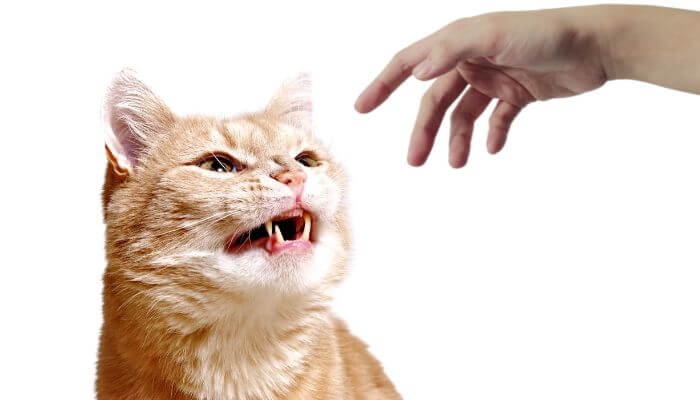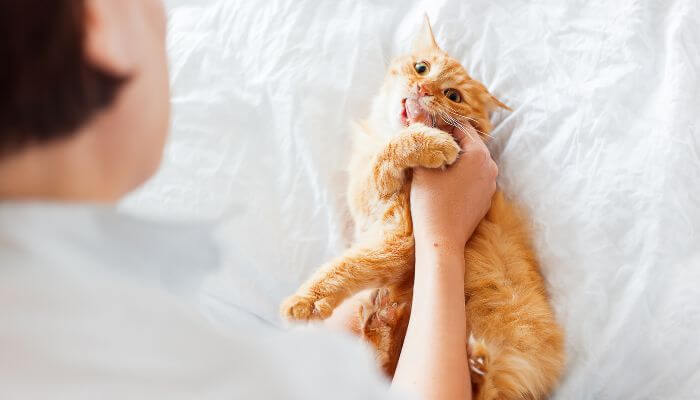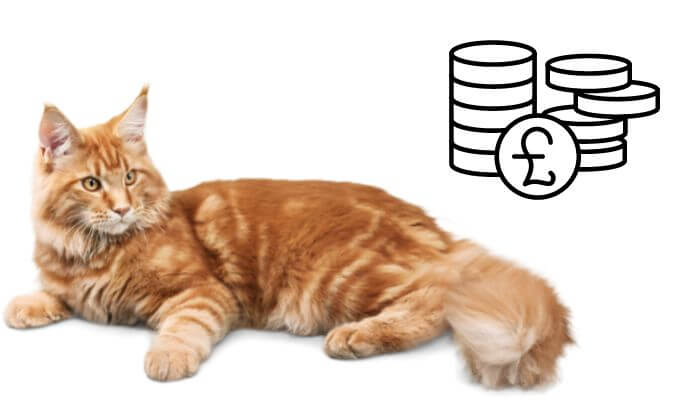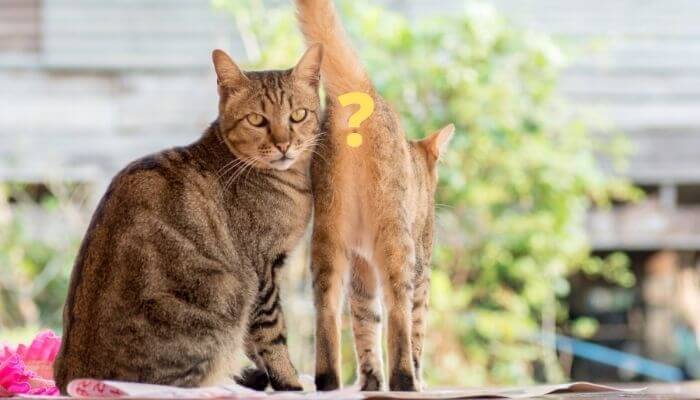No, ginger cats are not known to be more aggressive than other cats. However, most ginger cats are male and males are typically more aggressive than females, particularly when they are unneutered.
Male ginger cats are often assertive and vocal while female ginger cats are known to be calmer.

Contents
Why Is My Ginger Cat Behaving So Aggressively?
There are a number of possible reasons a cat is behaving aggressively, these include:
1) Fear
If your cat has suddenly become aggressive, they are most likely becoming defensive because of fear. The cat may feel they need to protect or defend themselves from a perceived threat.
How to help a cat with fear-based aggression:
- Provide lots of hiding place so your cat can hide when they don’t feel safe
- Use desensitisation techniques to help reduce the fear-based reaction
2) Overstimulation
If your cat is overstimulated they may become aggressive to show they need to be left alone. Learning to read and understand a cat’s body language can help owners understand what their cat wants before they become aggressive. This type of overstimulation is often linked to stroking and high-intensity interactions.
How to help a cat with overstimulation-related aggression:
- Watch your cat carefully to look for signs they want to be left alone
- Avoid touching sensitive/ more vulnerable parts of their body such as their belly
- Only pet your cat for short periods and don’t be heavy-handed

3) Play
Playing is a way that cats refine their hunting skills. Most cats will learn boundaries when they are younger but if they have not been well socialised, they may exhibit play aggression such as biting, scratching, kicking, and batting with their paws.
In this situation, it may seem like your cat is being aggressive and attacking you but they are actually playing and don’t know when they take it too far. There are ways to teach your kitten not to bite and scratch.
How to help a cat with play aggression:
- Play appropriately using toys to redirect your cat’s attention
- Provide enrichment including problem-solving toys and climbing trees so your cat has the opportunity to exhibit natural behaviours safely
- When playing goes too far, remain calm and walk away so you don’t reinforce the behaviour.
4) Pain
A cat that is unwell may be aggressive as a result of their discomfort. Illnesses that are commonly related to aggressive behaviour include hyperthyroidism, neurological disorder, dental issues, and degenerative joint disease.
How to help a cat with pain-related aggression:
- Take them to the vet for a check up – the vet may prescribe pain medication or recommend complementary treatment to help reduce your cat’s pain and discomfort.
- Avoid touching your cat’s painful areas
5) Redirected Aggression
A cat may redirect their aggression towards a person or another pet if they have become frustrated by something they are not able to react to. A common example of this is when a cat is looking out of a window and sees another cat but they cannot chase it away. The cat may become agitated and direct this towards the next person/ animal they see in the house.
How to help a cat with redirected aggression:
- Provide enrichment and toys
- Block the lower part of the window with curtains or film (if the trigger is another cat that is seen regularly from the window)
- Keep the house free from loud noises or rowdy people
Is There Any Scientific Reason Why A Cat’s Coat Colour Would Make Them More Aggressive?
Researchers are interested in possible links between cat coat colour and personality. Links have been found between coat colour and aggression in some mammals such as silver foxes and minks.

In the silver fox experiment the foxes were selectively bred for tame behaviour and these personality changes were also accompanied by a change in their coat colour. This suggests that temperament traits can be linked to physical characteristics.
A small study by the University of California-Davis found that tortoiseshell/ calico/ torbie cats were more frequently aggressive towards humans than other cats in the survey.
Is It Normal For Ginger Cats To Bite?
Cats often bite during play but they may also bite out of fear, stress, pain, dominance, or for attention. It is more common for kittens to bite during play as they are still learning. You can stop your cat from biting you by providing toys to redirect their attention away from you and by reinforcing good behaviour with treats and affection.
If your cat is suddenly biting you and you’re not sure why, a check up at the vet is a good idea to rule out pain-related aggression.







Leave a Comment